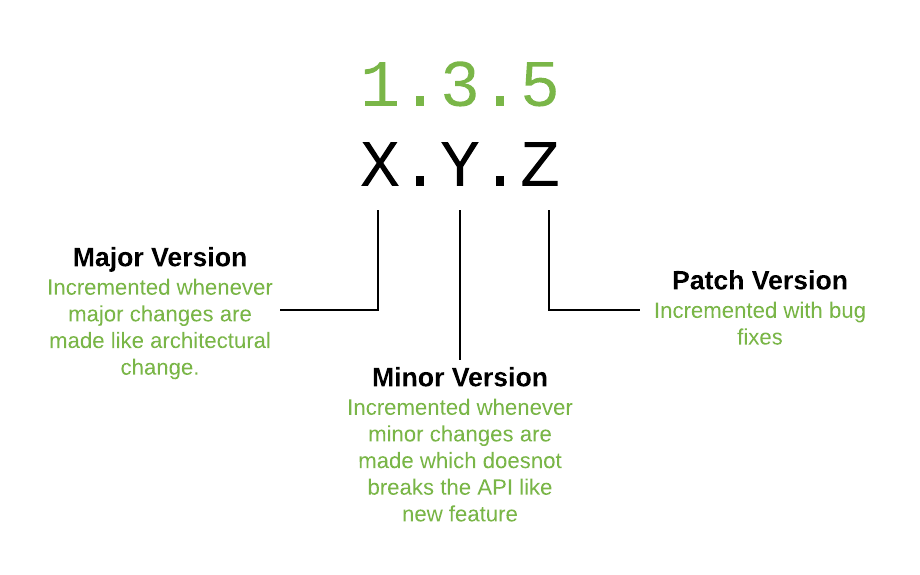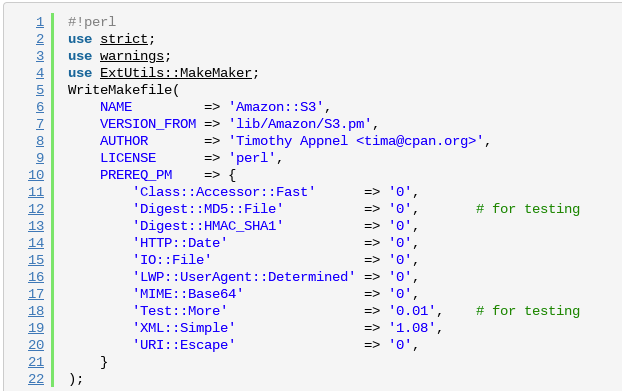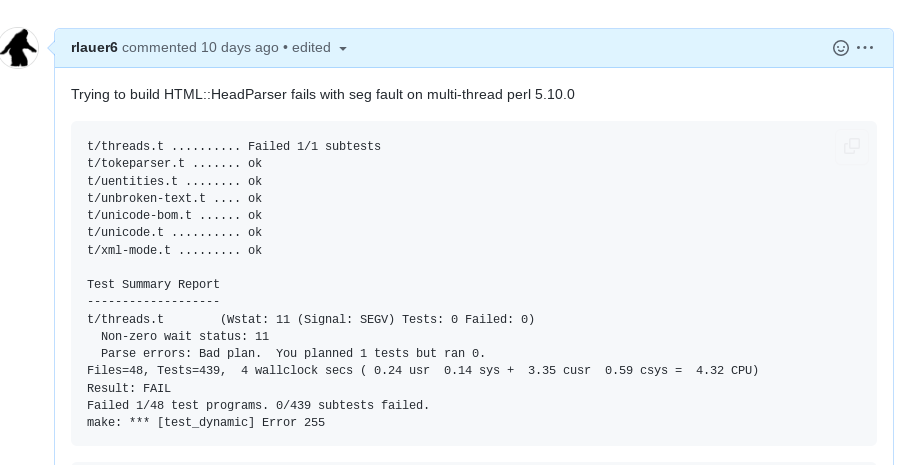
This is part III of my blog on versions. Last time we discussed
the question of what version of perl to use for development.
Conclusion: In most cases, the choice will be made for you,
especially in maintenance and legacy migration situations. If you have
the luxury and ability to use a more version of perl, use it. Let’s continue:
- [x] What version of
perlshould I be using for development? - [ ] If I publish a CPAN module, what version(s) of
perlshould I support? - [ ] What version of a dependency do I really need in my module?
- [ ] What should I do if I receive errors in the CPAN Testers Report?
- [ ] Should I include core modules as dependencies? (the answer is not as obvious as you might think)
If I publish a CPAN module, what version(s) of perl should I support?
For me, this has become more than just an academic question. Several years I ago I petitioned the Pause administrators to allow me to adopt Amazon::S3. It had been a long time since the module was updated and it needed a little TLC to support new features and fix some deficiencies. The adoption process took a lot longer than I had imagined. Between the time I requested co-maintainer rights and the time it was actually granted the urgency and desire to adopt the module waned. Recently the need to update this module has re-appeared so I began making some much needed improvements. My first release to CPAN of the updated module was 0.49 and thus began my introduction to CPAN Testers Reports.
| Version | Max Version Passing | Min Version Passing | First Failure | O/Ss With Passing Version |
|---|---|---|---|---|
| 0.49 | 5.36.0 | 5.14.4 | 5.32.1 | darwin, freebsd, linux, mswin, openbsd, solaris |
| 0.50 | 5.37.1 | 5.14.4 | 5.34.1 | darwin, freebsd, linux, mswin, openbsd, solaris |
| 0.51 | 5.37.1 | 5.14.4 | 5.18.4 | darwin, freebsd, linux, mswin, openbsd, solaris |
| 0.52 | 5.37.1 | 5.14.4 | 5.8.9 | darwin, freebsd, linux, mswin, openbsd, solaris |
| 0.53 | 5.37.1 | 5.14.4 | NA | darwin, freebsd, linux, mswin, openbsd, solaris |
| 0.54 | 5.37.1 | 5.14.4 | 5.37.1 | darwin, freebsd, linux, mswin, openbsd, solaris |
My first release only passed (accidentally) on a few versions but
seemed to passs on at least 1 version of all operating systems
tested. The failures were all due to missing dependencies that I had
failed to identify in Makefile.PL. Thus a new release (0.50) was
required - somehow I made the same mistake, however as you can see
from the report, a new max version (5.37.1) emerges due to one of the
testers adding that version to its list of perl versions to test. I
say the tests that passed, passed accidentally, because I’m guessing
that those testers had (for some reason) the necessary modules
installed in their environment.
That’s an important point to consider - all testing environments are
not created equally. By looking at the reports, we can conclude
empircally that there must be something different about these
environments if the module fails on one tester’s version of perl
5.37.1 and another passes? Take this report for example:

Note the failed tester and the OS version. The version of the OS is
different in the failing tester’s report…however the failure was due
to XML::Simple not being installed because it was missing from the
list of dependencies in Makefile.PL. So why did the other’s pass?
The conclusion must be that XML::Simple was somehow present in those
environments otherwise they would would failed there as well.
Some other oddities of the CPAN Testers Reports is what versions of
perl are used for testing the module. After releasing 0.50 I noticed
that version 5.8.9 of perl suddenly showed up in the testers
report. Hmmm…should I try to support that version? Is there a
reason it shouldn’t pass on 5.8.9? What versions of
perl did the original author’s 0.45 version support? Well, as it
turns out when that module was tested in 2012, it support 5.6.2!
Should I support 5.6.2? Would it actually be possible to support
perl 5.6.2?
The answer as it turns out is no. Version 0.45 would probably not pass
version 5.14.0 due to the versions of perl that are required by the
module’s dependencies.
Version 0.45 specifies that any version of
LWP::UserAgent::Determined will do, which in term will require
any version of LWP.

As I futilely attempted to see what the minimum
version of perl my adopted module could support I attempted to
build LWP on version 5.10.0 of perl. Unfortunately, LWP would
not build on 5.10.0 (actuall it was the module HTTP::HeadParser that
is part of libwww-perl that failed unit tests) so I dutifully
filed an issue assuming that the authors of LWP would want to know
that the module does not build on 5.10.0.

The response to my report was suprisingly - let’s bump the required
version of perl to 5.14. So, while LWP successfully builds on
5.14.0, LWP::UserAgent::Determined does not.

After a lot of useless traversing down rabbit holes I was able to
determine that installing an older version of LWP would, in fact succeed in
building LWP::UserAgent::Determined. The rub here however is that
other modules like XML::Simple require yet other modules that
specifed that any version of LWP would do. If the dependency
that required any version of LWP is installed prior
to installing a specific older version of LWP listed in my manifest,
well, now we’ve installed an incompatible version of LWP because
specifying any version of LWP will bring in the latest version.
Now, if cpanm had done the right thing and installed specific
versions of modules specified in the dependency list first, then the
older version of LWP would have satisfied the requirement. This is
not to say that cpanm did the wrong thing…it got the list of
direct dependencies from the distribution and started installing them.
To be fair, the versions of perl I have been testing against are
old. CPAN authors should not be bound to supporting older versions of
perl at the expense of modernizing or enhancing their modules. The
point is to simply illustrate the difficulty in releasing a CPAN
module that does support older versions of perl.
So should I then conclude that I need to bump the minimum version of
perl that Amazon::S3 will
support to something like 5.16.3? If I still want to support older
versions of perl would it even be possible to find the versions of
dependent modules that do not break my build? Does that even make any
sense when modules are sometimes updated to fix bugs?
As it happens, I did manage to get a working build for perl 5.10.0
and 5.14.0. Of course, it was a forensics exercise and not very
satisfying to be truthful.
By installing version 6.13 of LWP and version 2.14 of
HTML::HeadParser I managed to somehow get
Amazon::S3 to build
and complete all tests successfully.
The guidelines to support older versions of perl seem to be:
- Only use features from the minimum version of
perlyou plan to support - Verify that any dependent modules also conform to #1 and can be
built on the minimum version of
perlyou plan to support - Verify that your unit tests are comprehensive enough so that if there are bugs in older dependent modules, they do not effect your code
- Be specific about the version of dependent modules required by your module
more next time…

 www.linkedin.com/in/robert-lauer-1590513
www.linkedin.com/in/robert-lauer-1590513